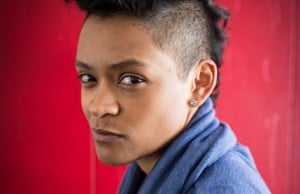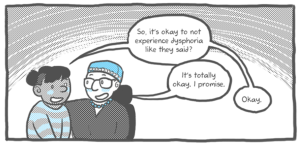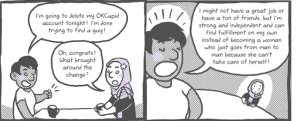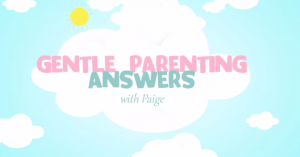When I was in college, I told my family I was dating a girl for the first time.
We were out for dinner with my two younger brothers, and after yet another anecdote about a pal from school, one of them said, “Are all your friends gay now?” They weren’t, but I was hanging out with a pretty queer crowd, and it felt weird not to mention my own romantic situation. So I did.
But while I was okay talking about who I was seeing, I didn’t have a label – no “Hey everyone, I’m a lesbian!” or “I’m bi!” coming out moment to share.
Partly, that was because I was in the process of figuring out where I was at in regards to all these things.
And though it wasn’t a word I used, that’s something a lot of people refer to as questioning.
But you know who wasn’t questioning? My mom. She didn’t ask me anything about the person I was involved with, let alone about how I identified. She just mumbled something noncommittal about how busy I was at school, and then we went back to chatting about my brother’s track meet and the talk she was giving the next day.
My mom’s non-response wasn’t awful. There was none of the anger, or denial, or lecturing that so many people have to endure. But it felt a little dismissive and, as a result, kind of uncomfortable.
And while it is not that every family interaction needs to be comfortable, the more parents understand about what it means to question, the better able they will be to support their children if this issue comes up.
So here are a few things that parents should know.
1. What Does It Mean to Question?
Questioning refers to people who have uncertainty about their sexual orientation. Some people question whether they are queer. Others question whether they are hetero. It’s also common to wonder if you have a sexual orientation at all.
A lot of people assume that questioning is only something people do on the path to figuring out an LGBTQIA+ identity. But research has determined that this isn’t the case.
For example, a study published in the journal’ found that since we assume heterosexuality to be the default, it is more common for men who ultimately identify as gay or bisexual to go through a questioning process.
However, questioning is still a really common experience for men who ultimately identify as hetero.
As they write, “More than 50% of ‘exclusively straight’-identified men indicated having questioned their sexual orientation.”
A paper in the Journal of Sex Research found a similar experience in women. It reports that in a survey of heterosexual-identified women, the large majority “were deliberately identifying as heterosexual after contemplating alternative possibilities.”
Since both these studies demonstrate that questioning is a common experience across the board, it’s no wonder that so many teens find themselves pondering their sexual orientation alongside so many other life questions.
2. What Is the Difference Between Being Bisexual and Being Sexually Fluid?
Sexuality is not always something that is set in stone for someone’s entire life. But when it comes to whom we partner with, any shift can be seen as some big definitive statement about our identity.
Indeed, in almost all areas of life, we accept that people will have different experiences, interests, and tastes at various points.
Yet when it comes to sexual orientation, we seem to expect people to have clear answers to one of the more complex aspects of the human experiences from the get-go.
As a result, we often confuse different aspects of sexuality. This happens a lot when it comes to questioning around bisexuality and sexual fluidity. Though these might seem like the same thing, they’re actually pretty different.
Being bisexual is a discrete sexual orientation that refers to being interested in people of one’s own a/gender and in people of other a/genders.
On the other hand, people who are sexually fluid, often feel that their attraction is situational and shifts due to particular partner, their environment, and the time in their life.
As Dr. Dylan Selterman explains at the Science of Relationships,
The degree to which a person is sexually fluid is a separate variable that operates alongside sexual orientation. Some people are highly fluid, while others are less fluid…If you ask people who identify as straight, but then have sex with someone else of the same gender, this experience does not necessarily make them ‘bisexual,’ but it does make them sexually fluid.”
Since we so often overlap these two concepts, it isn’t surprising that we often assume that interest in someone of the same gender is a sign of sexual orientation, when in fact it may be something quite different.
But when something changes, it is common to have questions about why a change is occurring and where it will lead.
3. What Is Sexual Orientation If It’s Not About Sex Acts?
Obviously, sex can be a part of sexual orientation, but it sure isn’t the only, or often, even the most relevant part for young people.
But many parents unnecessarily sexualize their questioning kids.
That’s because a lot of people mistakenly associate sexual orientation exclusively with having sex despite the fact that sexual orientation is really complex and involves everything from self-concept, to romantic interest, and identity.
Plus, a kid might be figuring out an asexual, agender, or transgender identity and sex with another person might not be the issue that is most salient to their process of identification.
It’s also common to believe that in order for someone to really know they aren’t hetero, they need to have sex with a same gender partner.
As a result, parents may assume that a questioning kid is coming to their questions after doing so.
And while having sex can definitely give teens more to think about, plenty of people have plenty of questions long before they are ever sexual with another person.
We never doubt that a hetero kid knows that they are into the other gender absent of sexual experience, yet it is pretty common to do this when a kid identifies as queer.
3 Ways to Support Your Questioning Child
So now that you know the basics about questioning, you might be wondering how can you best support your questioning child?
Here are three ways.
1. Don’t Dismiss a Questioning Child as ‘Just Going Through a Phase’
Being told that who you are is a “phase” or that you will grow out of feeling a certain way can be pretty awful. But when teens question their a/sexuality, this is a standard message.
And so what if down the line your child doesn’t identify as queer? No need to go back and pull the old “I told you so” on them! It is perfectly normal for young people to question a range of aspects of their identity.
Plus (and this should be obvious), teasing a kid about her One Direction phase is really different than teasing someone about their bisexual phase.
2. Check Your Own Homophobia
Sometimes homophobia (both the kind you admit to, and the kind you’d rather not acknowledge) can color your reaction to questioning and can make a parent worry that questioning is actually the first step to coming out as queer.
If this is the case, try to get to the root of your discomfort and ask yourself what’s really driving it before you approach your child. Here are some good tools for parents on that front:
Stop viewing sexual orientation as a choice (and if a person is queer, as a bad one).
If you belong to a strongly anti-LGBTQIA+ religious group, leave it. If that isn’t an option, do your own research on what your religion really says about sexual orientation. Most homophobic religious beliefs are based on interpretations of texts, not on the core of a religion.
Think about which aspects of being queer make you uncomfortable, then examine those. Is your hostility based on negative stereotypes?
Do your homework, and you will often be surprised by how off base some commonly held views are!
Get support. This could be in the form of an LGBTQIA-friendly therapist, or an organization like Parents,Families, Friends and Allies United With LGBTQ People. Other parents have gone through this and you don’t have to reinvent the wheel alone.
3. If Your Kid Is Sexually Active, Try Not to Freak Out About It
Don’t assume that a teen who is questioning and sexually active is automatically having sex with a lot of people or is taking sexual risks in the process. Try to help your child stay safe sexually by allowing them to come to you with questions.
Make it possible for them to use contraception and practice safer sex. Set them up with medical appointments. And, yes, even allow them to have sexual privacy with a partner at home.
Teen sex alone is not dangerous, but the conditions under which many teens have it, sure can be!
***
For some people sexual orientation is clear from the start. For a lot of others, not so much.
But while many young folks question their sexual orientations, many of parents are uncomfortable with this process. So it is important to understand that questioning is a common and normal part of adolescence.
Here’s one way to think about it: No one thinks it is strange that you might really be into ice cream, then go off ice cream for a while and get really into cupcakes.
Nor do they raise an eyebrow when you later kind of wonder if you might want ice cream again, get a small bowl and decide it’s okay, but that you still might be more in the mood for a cupcake. Not even worth mentioning, right?
Yet when it comes questions about sexual orientation or changes in how we experience it, reactions tend to be a lot less muted.
Now obviously, our sexual orientations are a lot more complicated that our tastes in dessert. But if we allowed just a bit of the leeway to our kids when they question this aspect of their identity that we give to them in so many other parts of their lives, their experiences of figuring out who they are in this world would likely be a whole lot smoother.
[do_widget id=’text-101′]
Ellen Kate is a Contributing Writer for Everyday Feminism. She’s a health educator, sometimes writer, and mom. She has worked at Manhattan’s Museum of Sex, developed sex education curricula in Mumbai, India, and run HIV prevention programs for at-risk teens in the South Bronx. Currently, Ellen runs a middle and high school health education program and teaches human sexuality at Brooklyn College. More of Ellen’s writing can be found here. Follow her on Twitter @ellenkatef.
Search our 3000+ articles!
Read our articles about:
Our online racial justice training
Used by hundreds of universities, non-profits, and businesses.
Click to learn more





















